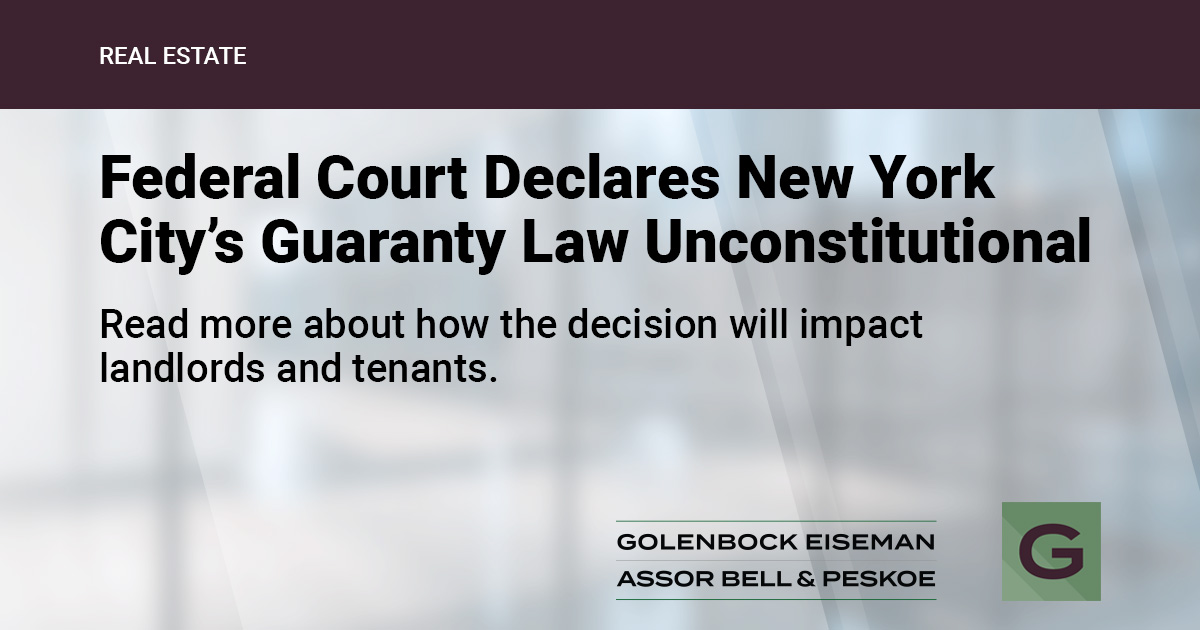On Friday March 31, 2023, Judge Ronnie Abrams, United States District Judge for the Southern District of New York (“S.D.N.Y.”), held that the 2020 New York City law protecting certain guarantors of commercial leases (known as the “Guaranty Law”) is unconstitutional, in violation of the Contracts Clause of the United States Constitution. See Melendez, et al. v. The City of New York, et al., 20-CV-5301 (RA) (S.D.N.Y., March 31, 2023).
What is the Guaranty Law?
N.Y.C. Local Law No, 55 of 2020, known as the “Guaranty Law”, was first passed by New York City’s City Council on May 26, 2020, and subsequently extended on September 28, 2020 and March 25, 2021. In its final form, the Guaranty Law renders personal guarantees associated with certain commercial leases unenforceable with respect to defaults under such leases occurring between March 7, 2020 through June 30, 2021 (the “COVID Period”). The law was passed as part of a slate of local ordinances aimed at combating the pandemic’s economic impact.
Procedural Background
Melendez and other landlords commenced the underlying action against the City of New York and associated officeholders claiming, among other causes of action, that the Guaranty Law was unconstitutional. In November 2020, Judge Abrams of the S.D.N.Y. granted the City’s motion to dismiss the landlords’ complaint, finding that the Guaranty Law was not unconstitutional. However, the landlords appealed to the Second Circuit, which reversed in part Judge Abram’s decision, identifying certain concerns about the Guaranty Law being a “reasonable and appropriate means” for the City to achieve its professed public purpose, as the Contracts Clause requires. The Second Circuit remanded the case back to the S.D.N.Y with instructions that the City develop the record to “identify … the circumstances relevant to determining whether the Guaranty Law is reasonable and appropriate.” The parties subsequently filed cross-motions for summary judgment.
Guided by the Second Circuit’s specific instructions, on the second go-around, Judge Abrams found that the City had been unable to adduce record evidence demonstrating that the Guaranty Law is reasonably tailored to accomplish its legitimate policy goals. Accordingly, Judge Abrams found that the Guaranty Law violates the Contracts Clause of the United States Constitution, and granted the landlords’ motion for summary judgment.
It is unclear whether the City will appeal or seek a stay of the decision.
What does this mean?
As a result of the S.D.N.Y.’s recent decision, New York City property owners who have claims against commercial lease guarantors for unpaid rental arrears which are owed from the COVID Period may now be able to recover these previously unenforceable arrears from guarantors.
We have represented clients in a number of previous lawsuits involving the Guaranty Law, and we may now see a new wave of litigation by landlords seeking to enforce COVID Period guarantees.
We will continue to monitor any developments.
# # #
For further assistance please contact your primary Golenbock Eiseman Assor Bell & Peskoe attorney or any of the attorneys listed below:
Steven Hochberg (212) 907-7343
Email: shochberg@golenbock.com
Joseph Ginsberg (212) 907-7355
Email: jginsberg@golenbock.com
Michael Munoz (212) 907-7345
Email: mmunoz@golenbock.com
About Golenbock
The Golenbock law firm was founded on a pragmatic business model-to provide the highest quality legal services by top-notch attorneys, free of the layers of professional and administrative bureaucracy that drive up legal costs at the largest law firms. The firm provides representation and counsel to midsize businesses , hedge and venture capital groups, entrepreneurs, and celebrities in their personal and business lives. Golenbock Eiseman Assor Bell & Peskoe LLP is a full-service Manhattan-based business law firm of approximately 60 attorneys which has served its clients’ complex litigation, corporate, labor & employment, reorganization, intellectual property, real estate, tax, and trust & estate needs for 40 years.
# # #
